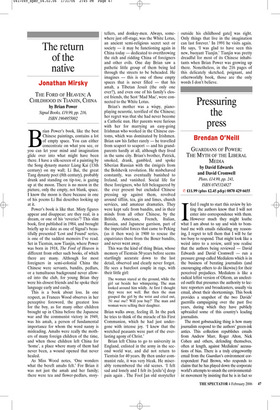The return of the native
Jonathan Mirsky
THE FORD OF HEAVEN: A CHILDHOOD IN TIANJIN, CHINA by Brian Power Signal Books, £19.99, pp. 216, ISBN 1904955002 Brian Power’s book, like the best Chinese paintings, contains a lot of empty space. You can either concentrate on what you see, or you can let your mind and imagination glide over into what might have been there. I have a silk-screen of a painting by the Song dynasty master Liang Kai (13th century) on my wall; Li Bai, the great Tang dynasty poet (8th century), probably drunk and standing on tip-toe, is gazing up at the moon. There is no moon in the picture, only the empty, not blank, space. I know the moon is there because in one of his poems Li Bai describes looking up at it.
Power’s book is like that. Misty figures appear and disappear; are they real, in a dream, or one of his ‘reveries’? This slim book, first published in 1984, and brought briefly up to date as one of Signal’s beautifully presented ‘Lost and Found’ series, is one of the saddest memoirs I’ve read. Set in Tientsin, now Tianjin, where Power was born in 1918, The Ford of Heaven is different from other such books, of which there are many. Although for most foreigners in semi-colonial China the Chinese were servants, bandits, pedlars, or a tumultuous background never allowed into the club, for young Brian they were his closest friends and he spoke their language early and easily.
This is a book about loss. In one respect, as Frances Wood observes in her perceptive foreword, the greatest loss for the boy, as for many other children brought up in China before the Japanese war and the communist victory in 1949, was his amah, a person of fundamental importance for whom the word nanny is misleading. Amahs were really the mothers of many foreign children of the time, and when those children left China for ‘home’, a place where many of them had never been, a wound opened that never healed.
As Miss Wood notes, ‘One wonders what the bereft amahs felt.’ For Brian it was not just the amah and her family; there were tea and flower-pedlars, story tellers, and donkey-men. Always, somewhere just off-stage, was the White Lotus, an ancient semi-religious secret sect or society — it may be functioning again in China today — dedicated to overthrowing the rich and ridding China of foreigners and other evils. One day Brian saw a pathetic little group of them being led through the streets to be beheaded. He imagines — this is one of those empty spaces that is never filled — that his amah, a Tibetan Jesuit (the only one ever?), and even one of his family’s closest friends, the Scot ‘Mad Mac’, were connected to the White Lotus.
Brian’s mother was a wispy, pianoplaying neurotic, terrified of the Chinese; her regret was that she had never become a Catholic nun. Her parents were furious with her for marrying an easy-going Irishman who worked in the Chinese customs, which was dominated by Irishmen. Brian saw his father rarely — he travelled from seaport to seaport — and his grandparents hardly at all, although they lived in the same city. Brian’s brother, Patrick, smoked, drank, gambled, and spoke Siberian Russian with the émigrés from the Bolshevik revolution. He misbehaved constantly, was eventually banished to Ireland, and vanished. Social life for these foreigners, who felt beleaguered by the ever present but excluded Chinese pressing up against them, revolved around tiffiin, tea, gin and limes, church services, and amateur dramatics. They were kept safe from bandits, and in their minds from all other Chinese, by the British, American, French, Italian, Russian, and Japanese garrison, part of the imperialist forces that came to Peking (as it then was) in 1900 to rescue the expatriates there from the Boxer bandits, and never went away.
This was the kind of thing Brian, whose memory of Tientsin 50 years before seems startlingly accurate down to the last detail, observed and clearly never forgot. He sees a barefoot couple in rags, with their little girl: The woman stared at the ground, while the girl sat beside her whimpering. The man looked around him wildly. At first I thought they were not well. But then the man grasped the girl by the wrist and cried out, ‘Ni mai ma? Will you buy?’ The man and woman were selling their daughter.
Brian walks away, feeling ill. In the park he tries to think of the miracle of his First Communion, which he had just undergone with intense joy. ‘I knew that the wretched peasants were part of the everlasting agony of Christ.’ Brian left China to go to university in England, enlisted in the army in the second world war, and did not return to Tientsin for 40 years. By then under communist rule, it was very bleak. He miserably remembered the old scenes. ‘I felt sad and lonely and I felt its [exile’s] deep pain again . The Fool [an old storyteller outside his childhood gate] was right. Only things that live in the imagination can last forever.’ In 1991 he visits again. He says, ‘I was glad to have seen this new, buoyant Tianjin.’ Tianjin was pretty dreadful for most of its Chinese inhabitants when Brian Power was growing up there. Nonetheless, in the 216 pages of this delicately sketched, poignant, and otherworldly book, those are the only words I don’t believe.





























































































































 Previous page
Previous page